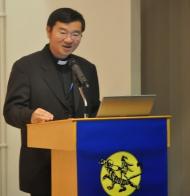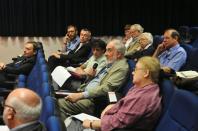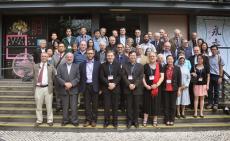Fr Fernando Mateos SJ, the 94-year-old historian of the Jesuit Chinese Province, provided an original voice at the recent international symposium on the Suppression and Restoration of the Society of Jesus. His complete and in-depth account of the suppression and restoration of the Society in China, together with details of Jesuits, their places of work and ecclesial and diplomatic endeavours to resurrect the mission, provided participants with vivid and authentic stories of their struggles and sacrifice for the new Society. He left the audience with little doubt of the mark these Jesuits made on the Society’s global history and its future.
Fr Mateos’ paper was one of several presented at the International Symposium titled “Jesuit Survival and Restoration 1773-1814: 200th Anniversary Perspectives from Boston and Macau”, held in Macau from October 28 to 30. The symposium was jointly organised by the Macau Ricci Institute and the Institute for Advanced Jesuit Studies of Boston College in the United States, as part of the celebration of the bicentennial of the Restoration of the Society.
The Symposium’s opening was graced by Bishop of Macau, Dr José Lai; Professor Rui Martins, Vice-Rector of the University of Macau; and Fr John Lee Hua SJ, Provincial of the Jesuit Chinese Province. The event drew a good number of participants from Hong Kong and Macau.
In his welcome address, Macau Ricci Institute director, Fr Artur Wardega SJ, stressed the importance of the Restoration for the Church and the Society. He reminded the audience that the Society in globo [as a whole] was never completely suppressed and that the beginning of its reconstitution started together with the new century (1801 Pius VII brief Catholicae Fidei).

The symposium discussed various national expulsions and banishments following the suppression that sought to destroy the Society as a corporate entity. Close attention was paid to the four most important engine-rooms of Jesuit activity during this turbulent period: East-Central Europe and Russia, China and Macau, the United States and Latin America. What happened in and between these far-flung places defined the future of the Jesuit order and had momentous consequences for the broader religious and cultural history of these continents.

One of the most striking examples of Jesuit enterprise was China. From the intellectual centre of the Society in Połotsk, they attempted to re-approach the last Jesuits in Beijing through their easternmost station in Irkutsk in Siberia and their community in St Petersburg, respectively.
Jesuits exiled from Portuguese Macao found refuge in continental China, where the Society has sustained its important role in the historic encounter between East and West, initiated by Fr Matteo Ricci SJ.
The symposium also covered the crucial links between Jesuit survival in Eastern Europe and North America. Five former Jesuits in the United States renewed their vows [in 1805] a decade before the Order was officially restored, and in a crucial move, the Polish Superior General Fr Tadeusz Brzozowski SJ (1805-1820) sent a group of his confrères to Boston to assist Bishop John Carroll SJ’s struggles for Georgetown College and to establish new institutions and missions across the United States.
In Latin America, Enlightenment ideas and a series of revolutions resulted in wars by several Latin American countries for independence. These involved a large number of regime changes and shifts between conservative and liberal governance, and Jesuits were often caught up in the turmoil by the progressive regimes of that time.

The symposium concluded with a guided visit to the Ruins of St Paul and St Joseph Seminary Church and a piano concert by well-known Polish composer Professor Zygmunt Krauze, who performed a special program for the symposium participants.
Read the paper on the Suppression and Restoration of the Society of Jesus in China by Fr Fernando Mateos SJ here.


